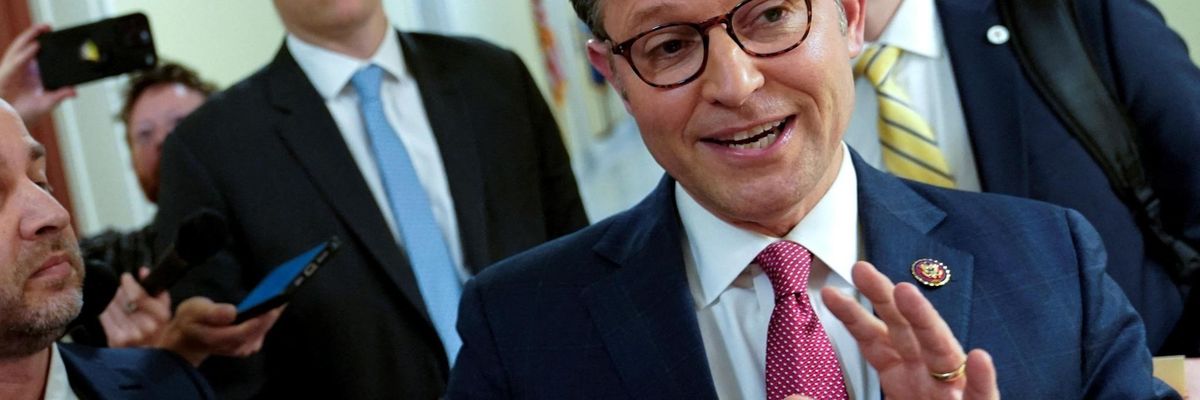Aid for Ukraine and Israel — a policy priority for the White House for the last month — remains in limbo after the House of Representatives passed a short-term measure that would keep the government funded into next year.
The Biden administration, with support from Senate leadership, has urged Congress to pass an $106 billion emergency supplemental that includes money for Kyiv and Tel Aviv as they continue their respective war efforts, as well as funding for border security and the Indo-Pacific.
Instead, recently installed Speaker Mike Johnson (R-La.), decided to pursue a two-step continuing resolution (CR) that will maintain current funding levels, with certain government agencies funded until January 19 and the rest of the government until February 2.
As recently as Saturday, the White House called the proposal “unserious,” but eventually reversed course and told House Democrats that Biden would support the legislation. The bill eventually passed overwhelmingly, 336-95, with 209 Democrats and 127 Republicans voting in favor. Only two Democrats and 93 Republicans opposed the measure.
Sen. Jack Reed (D-R.I.), the chairman of the Senate Armed Services Committee, explained during Politico’s defense summit earlier on Tuesday that keeping the government afloat had to take precedence over more potentially controversial issues.
“The first priority is to get the CR,” Reed said. “The second priority is to get funding for Israel and Ukraine … we have to do both.” It appears as if the White House and Democrats in the House eventually reached the same conclusion.
But it is unclear exactly how the second part of that plan would be accomplished. The House GOP earlier this month passed a bill that would have provided Israel with $14.3 billion, though it offset that spending by cutting funds for the Internal Revenue Service. Both the Senate majority and the White House have called that legislation a nonstarter.
On Ukraine, the terrain is even more tricky. “[C]ongressional interest in financing its fight against invading Russian forces has dipped lower than ever, and rising competition from other national security priorities — including Israel and the U.S. southern border — could sound the death knell for continued American aid for its embattled European ally,” explained the Washington Post on Tuesday.
The hesitance for continued aid has thus far come from Republicans in Congress, who argue that there are other more important priorities and that the Biden administration has not produced a strategy for how the war in Ukraine ends. A small but growing and increasingly loud minority of GOP members have held up funding for Kyiv, threatening to shutdown the federal government in September and later removing Speaker Kevin McCarthy from power in part because of their opposition to more aid.
“The growing prospect that Congress, amid this chaotic landscape, will simply not approve additional aid for Ukraine could have major geopolitical ramifications, undermining one of Biden’s central foreign policy objectives,” the Post story continues. “Republican lawmakers’ appetite for further helping Ukraine has been declining for many months, however, even before the nation’s much-anticipated summer offensive failed to produce any dramatic breakthroughs, as polling has showed a steady descent in the American public’s once robust support.”
Johnson’s own views on funding Kyiv are not obvious, as his rhetoric since assuming the Speakership mildly contradicts his consistent anti-aid voting record. He — like other Republicans — has said that there needs to be more clarity from the White House and more accountability for the money — but ultimately, he said last month, “we’re not gonna abandon them.” However, media reports since then say that it is “widely expected” that Johnson would not move to bring Ukraine aid legislation to the floor.
Other participants at the Politico Defense Summit on Tuesday, all of whom were supporters of approving another tranche, seemed cautiously optimistic that Kyiv would receive more aid once the government funding debate was settled.
Rep. Adam Smith (D-Wash.) the ranking member of the House armed services committee predicted that if a standalone bill to supply Ukraine with more was brought to the floor, it would receive “300 votes, easy.”
“The problem isn't getting the votes,” Smith said. “The problem is getting the Republicans to negotiate their politics so that they give us a vote to support Ukraine.”
Rep. Jim Himes (D-Conn.) said that the future of Washington’s support for Kyiv would be the “bellwether” for the status of American global leadership. “Will we ultimately deliver a package of aid to Ukraine?” asked Himes. “I think so.”
The Biden administration has stressed the importance of providing more support to Kyiv promptly, arguing that the war is at a crossroads.
The Senate, which has been more supportive of the White House’s proposal than the House, is expected to pass a version of Biden’s supplemental sometime soon. Leadership from both parties is reportedly hammering out the details and the Senate version likely won’t come to floor until lawmakers return from Thanksgiving recess.
"We have Democrats and Republicans working together to try to come up with a border security package that will have bipartisan support,” Majority Leader Chuck Schumer said on Tuesday. “But we have to get this done, and as soon as we come back in Thanksgiving, it will be a very high priority, get all four of them done, all four have bipartisan support in the House. Together.”
















